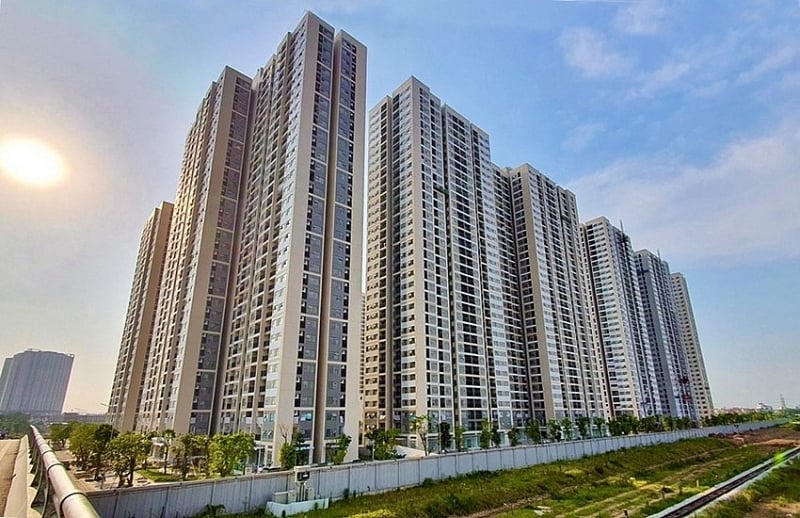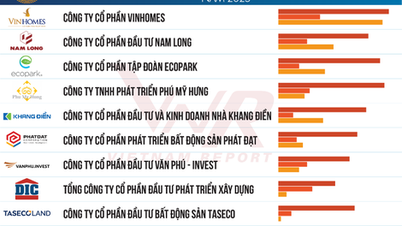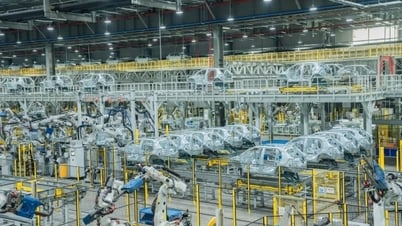Land is considered a type of asset, the longer it is kept, the more valuable it becomes. Meanwhile, apartments, especially apartments with a limited term, are a type of consumer goods, when used for a long time, they will lose value. However, the Vietnamese real estate market is experiencing a paradox, the value of apartments is increasing, becoming a type of asset that can be invested and transferred.
Talking to reporters of the Journalist and Public Opinion Newspaper, Mr. Ta Van Mung, Head of the OneHousing Transfer Sales Force Development Department, shared: In 2022, the selling price of apartments in the transfer market increased by 20% compared to the same period, many places recorded an increase of 30%/year. The reason is that the new supply of apartments in 2022 and the first half of 2023 is "dripping", while the demand for buying apartments of people is increasing, causing the transfer selling price to fluctuate and increase.

As primary supply becomes increasingly scarce, what will be the opportunities for investors in the transfer market, sir?
- In the context of scarce supply from the end of 2022 and no clear change at the present time, the transfer market will be the choice of investors who need to find a safe haven for cash flow before inflation shows no signs of improvement and many families have real housing needs.
For those who have money, their concern will be how to keep their money? If the interest rate in the bank is very low, the USD and VND ratio is large, the Vietnamese currency is depreciating, then choosing real estate will be the safest choice for them at this time. Because good real estate always has a price increase over time.
Meanwhile, transferred products always have the ability to generate cash flow - because these are assets that have been formed, have full legal documents, especially pink books, and can be traded immediately.
In particular, the liquidity factor of transferred real estate is always highly appreciated because it meets real needs, so when needed, cash flow can be easily liquidated.
There are many types of transfer transactions in the market. In your opinion, which type of transaction is most active in Hanoi ?
- Previously, buying an apartment and then reselling it would be easy to lose money because of depreciation over time. However, at this time, due to the scarcity of primary supply, investing in transferred apartments has become expensive and exciting. In 2022, project transfers, especially apartments, increased very well by 20-30%, and even since the beginning of this year when the general market was quite quiet, transferred project apartments still increased by about 3-5%.
Second, the price of primary apartments 5-7 years ago was considered high at 27-28 million VND/m2. But now, the primary price has been increasing continuously every year, with the average price reaching 47-50 million VND/m2, and can even reach 60-70 million VND/m2.
Thus, the apartments transferred until 2022 have been "compressed" for quite a long time, the prices have not increased in previous years, those properties are being priced below market price, so there is a wave of buying and selling transferred apartments taking place very strongly.
As for residential real estate products in the Hanoi market in particular, they are always traded at a fairly stable level and are already anchored at a high level. The price increase will fluctuate from 5 to 7% without any explosion, nor too quiet, or "frozen".

At this time, due to the scarcity of primary supply, investing in reassigned apartments has become expensive and exciting. (Photo: XD)
Do you think the transfer market is providing the necessary liquidity to further enhance the performance of the property market?
- Transfer transactions play a role in "keeping the fire burning" when the market is down, not exploding strongly, but these sparks only need to wait for the "East wind" to help the whole market flare up.
The transfer market has never had the concept of "freezing". Even when the primary market is frozen due to lack of supply or limited capital, the transfer market is still very high due to real demand, so there are always transactions and regular transactions, although not as strong as the periods when the cash flow is good. The fact that the transfer market always has stable transactions partly helps the real estate market in general to still have cash flow circulation and create many jobs as well as positively impact other industries related to real estate to develop accordingly.
When transferring good transactions, it will also impact and stimulate investors, helping investors assess the market situation and see opportunities to find new projects, creating supply for the primary market.
Before and during the transfer transaction process, what risks will the transaction participants (homeowner, buyer, broker) usually encounter?
- Real estate transactions in the transfer market are relatively complicated, not only for residential houses but also for apartments. Because there are many issues to pay attention to, this market is not for "novice" investors but must be very experienced or have the effective support of dedicated brokers.
In the transfer market, the risk for the homeowner is that the market is weak, it is difficult to find customers, it is difficult to make payments, customers have made deposits but then leave. The risk can come from unscrupulous brokers, brokers who do not know how to do the job, do not have consulting skills, do not have valuation skills... leading to damage for the homeowner.
There are homeowners who do not have full information, do not consult prices, they price the property below the market price. They call a broker and want to sell this house for 3 billion, according to the experience of a conscientious broker, this house can be sold for 3.5 billion, they will advise the homeowner in return, but an unscrupulous broker will be happy because the homeowner sells at a low price, they will sell quickly, easily, even buy the deposit to skim the deposit or sell at a difference with the customer, take advantage, make a profit...
The risk for buyers is similar. Buyers will encounter problems with the market, the market is going up, making it difficult to buy a house. Second is the risk of brokers, setting prices with the homeowner, brokers who do not understand the market, do not have many good products, are not professional, will not advise or introduce customers to many products, do not support, do not follow customers to complete the transfer of ownership procedures. Risks also come from the homeowner who receives the customer's deposit but does not sell the house; does not sell and does not return the deposit to the customer, the buyer has a very hard time asking for it.
On the broker side, there is often a risk of being cut off. The owner and the customer meet, then cut off the bridge to trade with each other because they do not want to pay brokerage fees.
Thank you!
Source










































































































Comment (0)